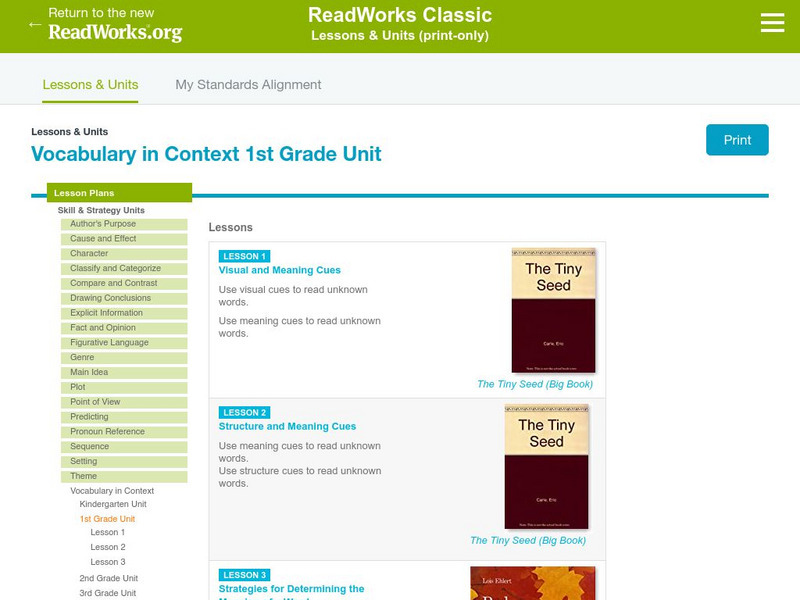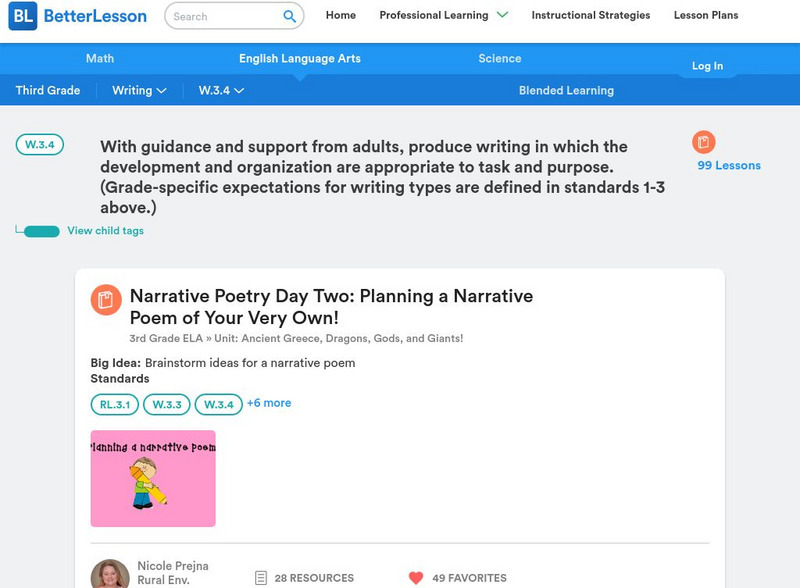Reading Rockets
Reading Rockets: "Seven Strategies to Teach Text Comprehension" by c.r. Adler
In this article, "comprehension strategies" are explained. Supported by research, these strategies are divided into seven different steps, including the following: monitoring comprehension, metacognition, graphic and semantic organizers,...
Utah Education Network
Uen: Lesson Plan: Text Structures in Science Writing
Lesson for teaching students to identify components of scientific texts and to use similar structures in their own scientific writing.
TES Global
Blendspace: Rl5.3 Fables: Analyzing Theme, Story Elements, Text Structure
A six-part learning module with images, graphic organizers, videos, web links and more to teach students how to analyze theme, story elements, and text structure in fables.
Other
Educeri: Compare & Contrast the Overall Structure in Two or More Texts [Pdf]
A 10-page handout that explains clearly what text structure is and four different types, with accompanying examples. Different types are then presented along with two pieces of informational text and a modeled analysis, then two other...
McGraw Hill
Mc Graw Hill: How to Use Strategies to Teach Students to Access Complex Texts
In this short video, the strategies of summarizing, clarifying, and asking-answering questions are used. These instructional tools will help teachers show students how to access complex texts. [5:54] CCSS.ELA-Literacy.CCRA.R.10
Curated OER
Glenco Online: Teaching Today: Reading Comprehension and Considerate Text
Learn the features of "considerate text" and ways to teach students to use these features to increase their comprehension as they read. These features generally apply to non-fiction, especially textbooks.
AdLit
Ad lit.org: Teaching Writing to Diverse Student Populations
Writing is a complex operation requiring knowledge of text structure, syntax, vocabulary, and topic, and sensitivity to audience needs; so it is not surprising that many teens find writing challenging. This article identifies the...
Yale University
Yale New Haven Teachers Institute: An Example of Greek New Comedy
This site is actually an in-depth lesson plan for the teaching of the Greek New Comedy, "The Grouch," by Menander. For learners, it provides a great deal of detail about the play and background material on Greek comedy as a whole....
Other
Mantex: Tutorials: What Is Close Reading?
This site discusses the four types of reading: Linguistic, Semantic, Structural, and Cultural and offers a detailed example of close reading. RL.11-12.3 Auth choice story elem, RL.11-12.5 Choice of Text Structure
TeachEngineering
Teach Engineering: Graph Theory in Drama
Students use graph theory to create social graphs for their own social networks and apply what learn to create a graph representing the social dynamics found in a dramatic text. Students then derive meaning based on what they know about...
AdLit
Ad lit.org: Reading (And Scaffolding) Expository Texts
To help students comprehend expository text structures, teachers can acquaint them with the signal or cue words authors utilize in writing each of the structures and use the graphic organizers offered in this article
Better Lesson
Better Lesson: W.3.1a: Introduce the Topic or Text They Are Writing About
Links to 12 lessons and activities that build student skills in standard W.3.1a: Introduce the topic or text they are writing about, state an opinion, and create an organizational structure that lists reasons.
Texas Education Agency
Texas Gateway: Teaching Expository & Persuasive Texts: Writing Expository Essays
In an expository essay, a type of informational text, the writer clarifies or explains something by using facts, details, and examples in a clear and concise way. To write an effective expository essay, students need a basic...
Read Works
Read Works: Grade 2: Three Lesson Unit: Main Idea
[Free Registration/Login Required] A series of three lesson plans designed to teach young scholars to identify main ideas through headings and chapter titles, and then to write appropriate titles of their own. Lessons are based on the...
ReadWriteThink
Read Write Think: Exploring How Section Headings Support Understanding
Teaching students to pay attention to headings and titles as they read? Here you'll find a practical application for using an expository text to apply the concept of using headings. Geared toward older elementary students, but lesson...
TES Global
Blendspace: Cause and Effect
This eleven-part Blendspace is designed to be used while teaching students how to analyze cause and effect. Links include reference sheets, a SMART Notebook Lesson, posters, practice worksheets, and guided practice opportunities.
Better Lesson
Better Lesson: Dylan Thomas v. Langston Hughes
Students will be given poems by Dylan Thomas and Langston Hughes and will determine the differing structure, style, and content of each poem. Included are detailed plans, copies of the poems, and examples of student work.
Better Lesson
Better Lesson: Procedural Text: Recipe
A teacher created lesson plan to help pupils conquer how to make connections between directions in an effort to create something. This activity will have students sharing recipes and understanding why recipes should be followed in sequence.
Better Lesson
Better Lesson: Using the Five Finger Rule
Students identify text features in nonfiction, as they continue to study cells' function as building blocks of organisms, and summarize the requirements for cells to live.
Other
Wisconsin Educational Communication Board: Into the Book
This series of videos and interactive activities provide an excellent set of resources for teaching or learning the 8 research based reading strategies provided here. After receiving your "key" you can investigate the features inside and...
Wisconsin Response to Intervention Center
Wisconsin Rt I Center: Reading Resources [Pdf]
This site provides a collection of reading strategy teaching resources. Strategies are arranged according to the ELA Common Core Curriculum Standards and grade level bands.
Read Works
Read Works: Vocabulary in Context 1st Grade Unit
[Free Registration/Login Required] This website provides a series of three lesson plans designed to teach learners to use visual, meaning, and structure clues separately and together to determine the meaning of unknown words. Lessons are...
Other
Nsw Dept. Of Ed.: "One World" [Pdf]
Reading unit plan about endangered animals from the New South Wales, Australia, Department of Education and Training entitled "One World" (Forty-four page PDF file). It contains ten days worth of teaching suggestions that use a variety...
Better Lesson
Better Lesson: W.3.4: Produce Writing Appropriate to Task and Purpose
Links to 99 lessons and activities that build student skills in standard W.3.4: With guidance and support from adults, produce writing in which the development and organization are appropriate to task and purpose.



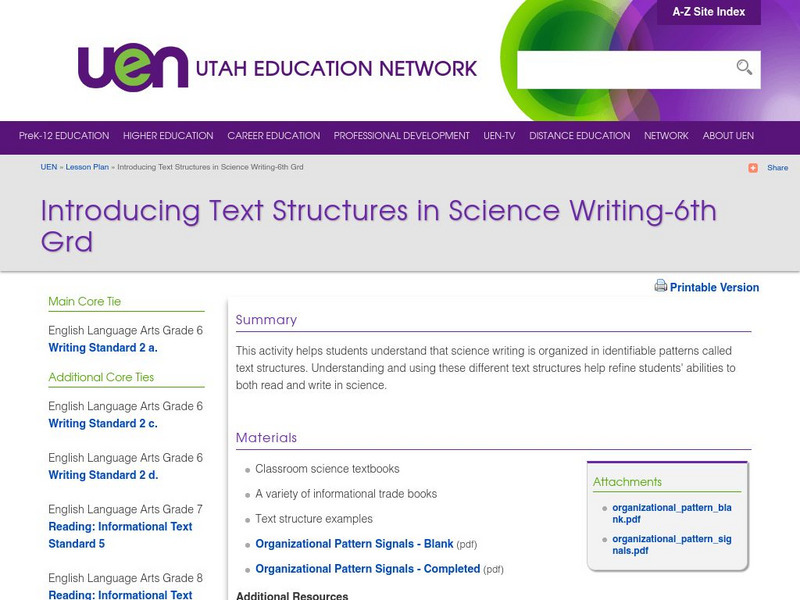

![Educeri: Compare & Contrast the Overall Structure in Two or More Texts [Pdf] Activity Educeri: Compare & Contrast the Overall Structure in Two or More Texts [Pdf] Activity](https://d15y2dacu3jp90.cloudfront.net/images/attachment_defaults/resource/large/FPO-knovation.png)

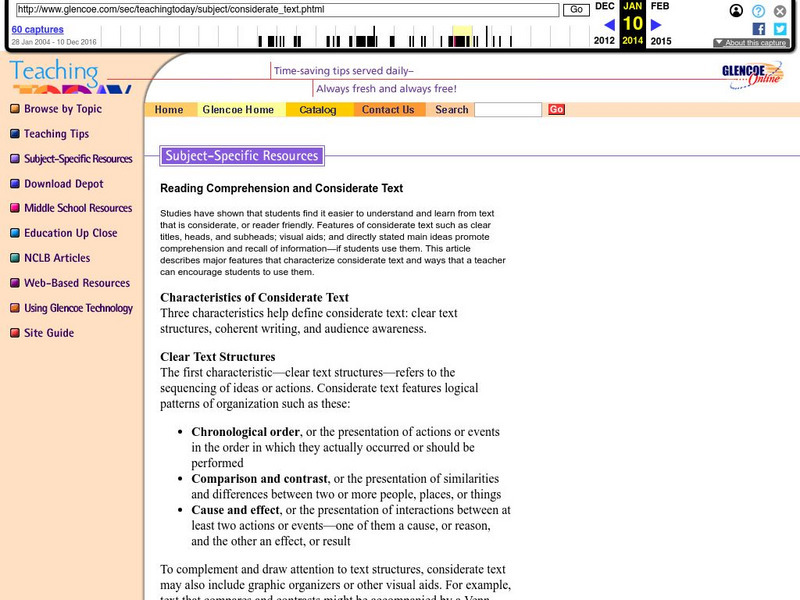

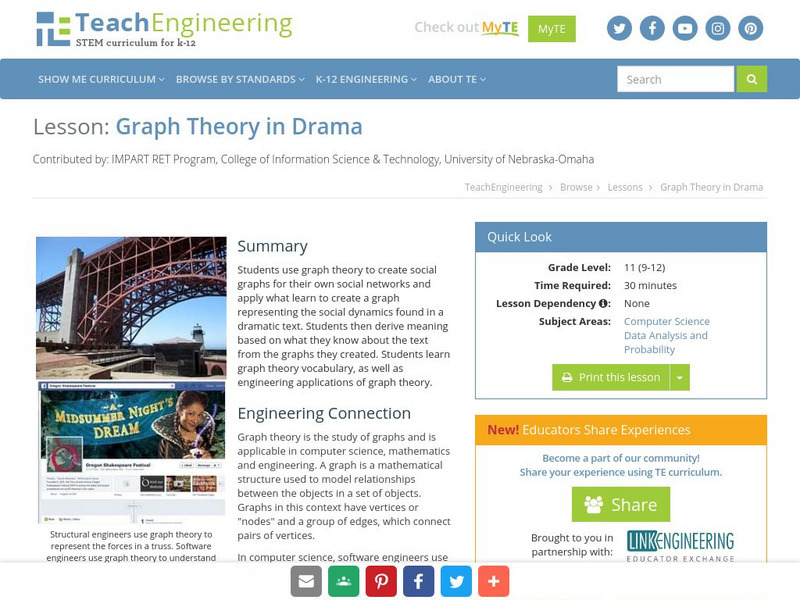



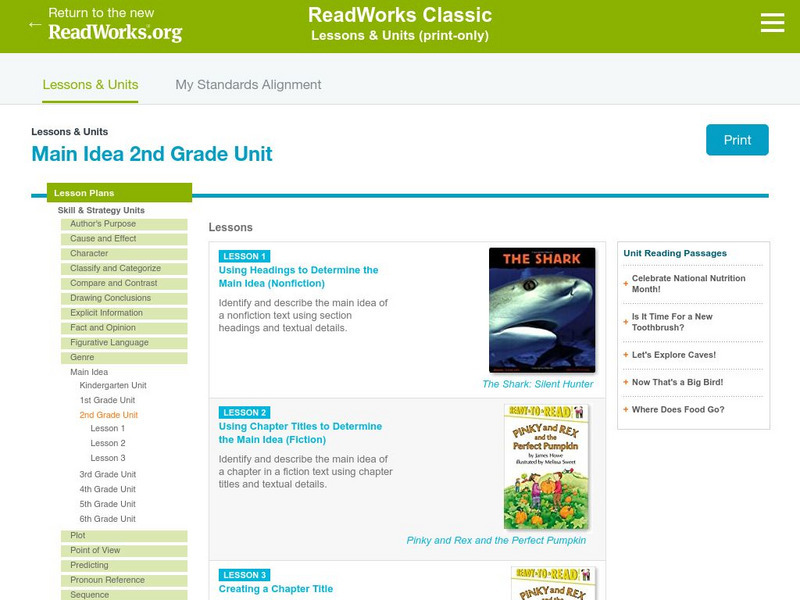




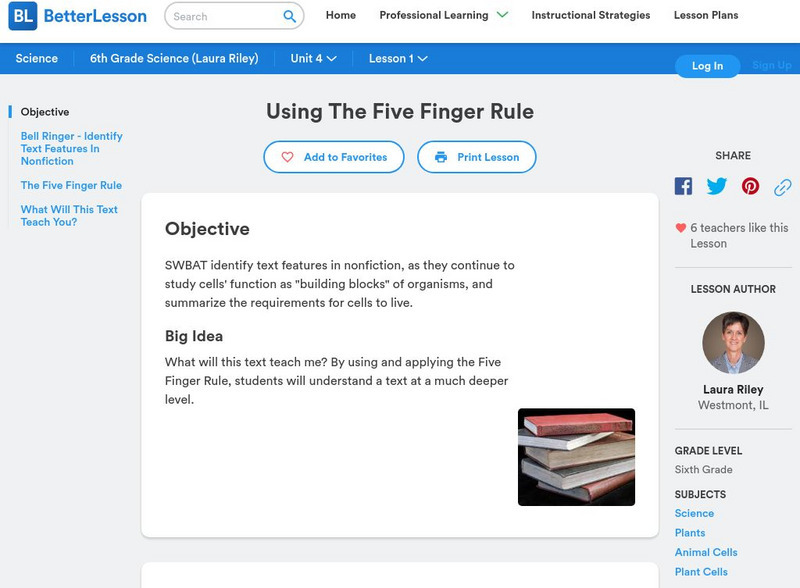

![Wisconsin Rt I Center: Reading Resources [Pdf] Professional Doc Wisconsin Rt I Center: Reading Resources [Pdf] Professional Doc](https://content.lessonplanet.com/knovation/original/366736-5cd279998cc3cbb7d56ecae193218c44.jpg?1661510893)
